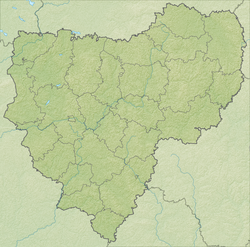| Battle of Liaskowa | |||||||
|---|---|---|---|---|---|---|---|
| Part of the French invasion of Russia | |||||||
 Cossacks were an irregular Russian cavalry best suited for the attack of the enemy’s supply lines without joining a major battle. | |||||||
| |||||||
| Belligerents | |||||||
| | | ||||||
| Commanders and leaders | |||||||
| | | ||||||
| Strength | |||||||
| 3,500 [1] 4 cannons | 2,000 [1] | ||||||
| Casualties and losses | |||||||
| 200 [1] | 2,000 [1] | ||||||
Location within Smolensk Oblast | |||||||
The Battle of Liaskowa (or Lyakhovo) took place 9 November 1812 near the village of Liaskowa, where 3,500 Cossacks under the command of Vasily Vasilyevich Orlov-Denisov (also under Denis Vasilyevich Davydov, Aleksandr Samoylovich Figner and Aleksandr Nikitich Seslavin) surrounded 2,000 soldiers of the Grande Armée under Jean-Pierre Augereau. [1]



